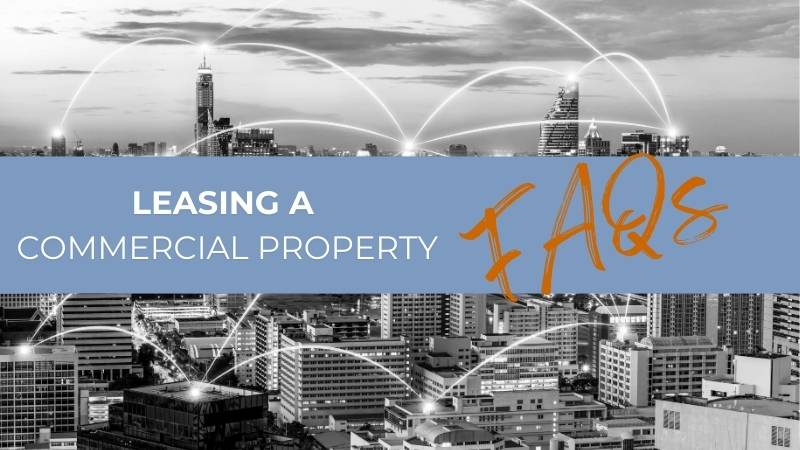As a business owner, deciding the location of your company or place of work is a big part of the business’ considerations. If you are a new business start-up or an established company that is growing and needs room for expansion, you need to decide if you are going to buy a commercial property or lease one.
Whether you need an office, shop or warehouse, leasing a commercial property is a big commitment and, in this article, we aim to provide some understanding of what to be aware of and give an insight into the most common questions our experts get asked.
What is a commercial property lease?
A commercial property lease agreement is a formal document that sets out the conditions and details associated with a tenant’s use and occupation of a commercial premises for business purposes for an agreed period of time.
It will include details such as:
- the term of the lease – (the number of years for which the lease runs)
- the amount of rent payable
- any other costs – such as service charge
- rent review clause – stating if there will be any periodic rent increases
- break clause – whether there is an early option to end the lease
- lease renewal options
It is not unusual for a lease to include certain conditions that must be met by the landlord prior to both parties entering into the formal lease agreement. These conditions could include the completion of certain works prior to occupation or may relate to planning permissions being granted.
It will also state that when the conditions which must be met when the tenant company) vacates the premises at the end of the agreed term, what conditions must be met, such as a schedule of dilapidations.
Will the lease agreement include a break clause?
Most commercial lease agreements will contain a break clause option which allows the tenant to exit the lease early provided that certain conditions are met, proper notice is given, and there are no outstanding payments due by the Tenant at the time notice is given or the date on which the lease ends. Similarly, there may also be a mutual break clause option that entitles either the tenant OR landlord to end the lease early. It is important to be aware of the date in which the break clause is effective because failure to give notice in time may result in missing the opportunity of an early exit should you want one.
What rights do commercial tenants have without a lease?
Without a commercial lease agreement in place there are limited legal obligations placed on the landlord and should any disputes arise, it can make matters difficult to resolve.
However, while commercial tenants without a lease do not have all the same rights as tenants who do, there are certain rights and considerations you should be aware of.
- Implied lease terms
- Notice requirements
- Right to a habitable premises
- Protection against unlawful eviction
- Fair use of security deposits
- Anti-discrimination laws
- Right to quiet environment
- Payment for improvements
- Commercial tenancies and local Laws
If you do not have a lease agreement, seek legal advice from a commercial property solicitor and they will advise you of your rights.
Does a commercial lease need to be registered?
The registration of a commercial lease is required under certain circumstances, including:
- Leases over seven years
- Assignment of Leases – this means if the existing lease has more than 7 years left and is transferred to a new tenant
- Short-term leases
- Compulsory First Registration – this is applicable to properties that are on unregistered land and a lease exceeding 7 years is granted
- Voluntary registration – if the lease is seven years or less, voluntary registration can provide legal protection and clarify the interest of the leasehold
Both landlords and tenants should seek legal advice to ensure compliance with registration requirements and to understand the benefits of registration for shorter leases.
Can a commercial lease automatically renew?
There are commercial leases that automatically renew however, there are a few things you should be aware of to avoid breaching any clauses in the agreement and leaving yourself open to legal consequences.
First and foremost, check your lease agreement! Within the agreement there will be a clause or section that outlines what happens at the end of your lease. It should specify if it is an automatic renewal, termination or extension.
You should also be aware of security of tenure which is a statutory right to an automatic renewal of a commercial lease at the end of the term (subject to some exceptions), granted under the Landlord and Tenant Act 1954 (LTA 1954)
Some leases are excluded from the LTA 1954 and are not renewable at the end of the Lease. The landlord will need to serve the tenant with statutory notices excluding sections 24-38 of the LTA 1954.
If you are unsure on where you stand regarding renewal or security of tenure, check your lease agreement or seek legal advice with a commercial property law expert who can clarify your legal position.
What happens if a commercial lease is not renewed?
Your lease agreement will have a clause that outlines what happens at the end of your tenancy and what is required of you before the end of the term. The landlord has the option whether to offer a renewal.
If the lease is not renewed and the landlord has terminated the tenancy, they must provide a section 25 notice. The tenant is required to leave the premises by the end date of the lease.
Within your lease agreement there will be clauses that outline any practical considerations such as dilapidations, inventory, fixtures and security deposits. Ensure you have read the agreement thoroughly to avoid any costly surprises at the end of your lease.
Please note that if the lease has been excluded from the LTA 1954, then the lease cannot be renewed.
Dilapidations
At the end of a tenancy term there is a responsibility of the tenants to fulfil any dilapidations required to reinstate the property to an acceptable condition. This may include repainting, wall repairs, removal of partitions and more. It is not unusual for tenants to be faced with unexpected responsibilities and costs and therefore, being aware of them from the outset is vital.
Before signing a commercial lease agreement, you need to make sure you understand what you are signing up to and that you are fully aware of your legal obligations and that of the landlord. Instructing a legal professional to review the document on your behalf is strongly recommended to ensure you are not faced with any nasty surprises down the line.
How can the Commercial Property team at Backhouse Solicitors help?
We have an extremely knowledgeable Commercial Property team who can help with your lease agreement, lease extension and other requirements. Our professionals offer prompt responses and deliver an excellent service. To speak to one of our experts, contact us today.
Tel: 01245 893400
Email: info@backhouse-solicitors.co.uk
Visit: 17 Duke Street, Chelmsford, CM1 1JU
Or send us a message through the Contact Us page on this website.






